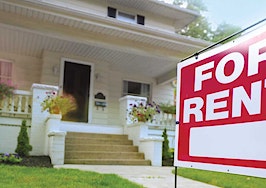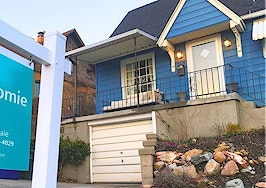Lew Sichelman is a seasoned writer with 50 years of covering the housing and mortgage markets under his belt. His biweekly Inman column publishes on Tuesdays.
Cleaning off my desk after the Thanksgiving holiday, I found these “leftovers” that are still worth a mention. Read on for a peek at the latest research into gender and ownership value, renting and capitalism, consumer perceptions and millennial trends.
Single females want to own
When it comes to home ownership these days, you’ve got to really want it. And single women want it more than their male counterparts, according to Bank of America’s latest homebuyer insight report.
Single females not only value homeownership more than single males (73 percent to 65 percent), they also place a higher priority on saving for a down payment (65 percent to 55 percent), according to the report’s spotlight on single female buyers. And they prioritize improving their credit scores more than unattached men, 49 percent to 42 percent.
“It’s exciting to see single women embrace their tremendous buying power,” Bank of America’s head of consumer lending, Steve Boland, said in a statement. “They’re interested in buying homes now more than ever before and are taking solid steps to prepare for the financial responsibility homeownership entails.”
What holds people back?
Single women are confident in their abilities, but they are still having a tough time saving for a down payment. Nearly half haven’t taken the leap into ownership because they haven’t put away enough money. Another factor delaying their move: They are more likely to feel overwhelmed by the prospect of ownership than single males (40 percent to 30 percent).
In another survey, this one from ValueInsured, a company that offers to protect buyer’s equity from a possible decrease in their home’s value, respondents tended to blame flippers and speculators for the exorbitantly high housing prices in their areas. They also faulted “wealthy transplants” who were moving to escape the high prices in their former locations.
Those theories aside, nearly 60 percent are now planning to hold off until prices subside. Even those folks who want to move up from one house to another are waiting for “a meaningful correction,” the survey found. And 14 percent said they’d drop out of the market altogether if a correction fails to materialize.
Consumer perceptions
They might not have to wait much longer, though, if another survey finding is on the mark — nearly 3 out of 4 people queried believe the market in their area is “cooling off,” ValueInsured’s fourth quarter survey of modern homebuyers found.
This shift in perceptions follows five consecutive quarters in which the majority of respondents said their markets were overheated. Nevertheless, 72 percent of all survey participants and 78 percent of those who are urban dwellers believe prices are still too darn high.
Generating wealth in real estate
Meanwhile, a working paper from the Austrian Central Bank says that owning real estate in general and becoming a landlord in particular is one of the best paths to accumulating wealth.
The study, which compares wealth between the United States and countries in the eurozone, finds that wealth can be broken down into three categories: renters, owners and capitalists. And the reason the latter group rises to the top percentile is the fact that they own their homes but also rent out other properties and/or run a self-employed business.
While renters’ wealth is mainly held for precautionary reasons, the survey said, landlords use theirs to generate income.
Although these “capitalists” comprise just 15 percent of the American housing market, they tended to dominate the upper end of wealth distribution. Renters, on the other hand, were largely found in the lower half, while owners were mostly in the upper-middle part of the scale.
Indeed, in both the United States and Europe, only a handful of capitalists remained at the low-end and just a handful of renters occupied the higher end.
Millennial trends
According to a CoreLogic report, millennials won’t stay long in their first house. Indeed, on average, they expect to move out and up in four to five years. That’s about half the time the typical American family stays put (nine years).
And in another report, this one from Zillow, would-be buyers carrying student debt (typically millennials) are severely handicapped when it comes to buying a house.
The average monthly payment for school loans is $388, Zillow said. That limits someone earning the median household income to just 52 percent of the houses currently on the market. With no student loan debt, that buyer can afford 66 percent of the places listed for sale.
Put another way, if people with just an average school loan payment wanted to spend no more than 30 percent of their income on a mortgage, they would have to curtail their house hunt to houses that are almost $92,500 less expensive than those someone without student debt can afford.
In other words, a renting household earning the median income but without school debt could go as high as $361,800, Zillow said, whereas his or her counterpart with the typical student loan payment could only afford a house priced at $269,400.
One more thing about millennials: an analysis by MagnifyMoney, a LendingTree website, found that those with student loans have a net worth that is only 25 percent (on average) of the net worth of those without such financial baggage. That is, those with school loans have an average net worth of $29,000 compared to $114,375 for loan-free folks.
Using data from the Federal Reserve, the analysis also found that debt-encumbered folk have lower ownership rates than their debt-free peers, and that those who do manage to purchase a house buy lower-valued places with a larger mortgage than their counterparts without student loans.
Lew Sichelman’s weekly column, “The Housing Scene,” is syndicated to newspapers throughout the country.













